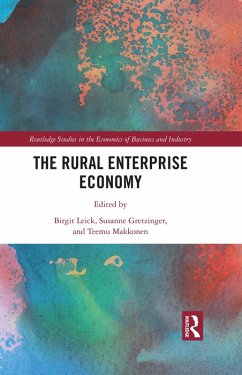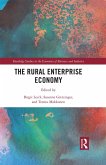The Rural Enterprise Economy (eBook, PDF)
Redaktion: Leick, Birgit; Makkonen, Teemu; Gretzinger, Susanne
43,95 €
43,95 €
inkl. MwSt.
Sofort per Download lieferbar

22 °P sammeln
43,95 €
Als Download kaufen

43,95 €
inkl. MwSt.
Sofort per Download lieferbar

22 °P sammeln
Jetzt verschenken
Alle Infos zum eBook verschenken
43,95 €
inkl. MwSt.
Sofort per Download lieferbar
Alle Infos zum eBook verschenken

22 °P sammeln
The Rural Enterprise Economy (eBook, PDF)
Redaktion: Leick, Birgit; Makkonen, Teemu; Gretzinger, Susanne
- Format: PDF
- Merkliste
- Auf die Merkliste
- Bewerten Bewerten
- Teilen
- Produkt teilen
- Produkterinnerung
- Produkterinnerung

Bitte loggen Sie sich zunächst in Ihr Kundenkonto ein oder registrieren Sie sich bei
bücher.de, um das eBook-Abo tolino select nutzen zu können.
Hier können Sie sich einloggen
Hier können Sie sich einloggen
Sie sind bereits eingeloggt. Klicken Sie auf 2. tolino select Abo, um fortzufahren.

Bitte loggen Sie sich zunächst in Ihr Kundenkonto ein oder registrieren Sie sich bei bücher.de, um das eBook-Abo tolino select nutzen zu können.
This book offers comprehensive answers to the question of what makes up the rural enterprise economy in the contemporary business world. It addresses the competitiveness and viability, strategic management and strategic change, and marketing issues for both incumbent and start-up companies in rural regions.
- Geräte: PC
- mit Kopierschutz
- eBook Hilfe
Andere Kunden interessierten sich auch für
![The Rural Enterprise Economy (eBook, ePUB) The Rural Enterprise Economy (eBook, ePUB)]() The Rural Enterprise Economy (eBook, ePUB)43,95 €
The Rural Enterprise Economy (eBook, ePUB)43,95 €![Digital Innovations for a Circular Plastic Economy in Africa (eBook, PDF) Digital Innovations for a Circular Plastic Economy in Africa (eBook, PDF)]() Digital Innovations for a Circular Plastic Economy in Africa (eBook, PDF)0,00 €
Digital Innovations for a Circular Plastic Economy in Africa (eBook, PDF)0,00 €![Making Sense of China's Economy (eBook, PDF) Making Sense of China's Economy (eBook, PDF)]() Tao WangMaking Sense of China's Economy (eBook, PDF)27,95 €
Tao WangMaking Sense of China's Economy (eBook, PDF)27,95 €![The Political Economy of Transnational Power and Production (eBook, PDF) The Political Economy of Transnational Power and Production (eBook, PDF)]() James M. CypherThe Political Economy of Transnational Power and Production (eBook, PDF)45,95 €
James M. CypherThe Political Economy of Transnational Power and Production (eBook, PDF)45,95 €![The Evolution of Economic Development in Africa (eBook, PDF) The Evolution of Economic Development in Africa (eBook, PDF)]() Francis K. MbrohThe Evolution of Economic Development in Africa (eBook, PDF)39,95 €
Francis K. MbrohThe Evolution of Economic Development in Africa (eBook, PDF)39,95 €![Emergency Preparedness through Community Cohesion (eBook, PDF) Emergency Preparedness through Community Cohesion (eBook, PDF)]() Jean ParkerEmergency Preparedness through Community Cohesion (eBook, PDF)43,95 €
Jean ParkerEmergency Preparedness through Community Cohesion (eBook, PDF)43,95 €![International Trade and the Music Industry (eBook, PDF) International Trade and the Music Industry (eBook, PDF)]() Lisa GordonInternational Trade and the Music Industry (eBook, PDF)20,95 €
Lisa GordonInternational Trade and the Music Industry (eBook, PDF)20,95 €-
-
-
This book offers comprehensive answers to the question of what makes up the rural enterprise economy in the contemporary business world. It addresses the competitiveness and viability, strategic management and strategic change, and marketing issues for both incumbent and start-up companies in rural regions.
Dieser Download kann aus rechtlichen Gründen nur mit Rechnungsadresse in A, B, BG, CY, CZ, D, DK, EW, E, FIN, F, GR, HR, H, IRL, I, LT, L, LR, M, NL, PL, P, R, S, SLO, SK ausgeliefert werden.
Produktdetails
- Produktdetails
- Verlag: Taylor & Francis eBooks
- Seitenzahl: 272
- Erscheinungstermin: 27. Oktober 2021
- Englisch
- ISBN-13: 9781000465853
- Artikelnr.: 62530670
- Verlag: Taylor & Francis eBooks
- Seitenzahl: 272
- Erscheinungstermin: 27. Oktober 2021
- Englisch
- ISBN-13: 9781000465853
- Artikelnr.: 62530670
- Herstellerkennzeichnung Die Herstellerinformationen sind derzeit nicht verfügbar.
Birgit Leick is Professor in Innovation and Entrepreneurship in the School of Business, University of South-Eastern Norway. Her current research interests are entrepreneurship in the creative industries, digital entrepreneurs and the sharing economy, and regional economic development. Susanne Gretzinger is Associate Professor at the University of Southern Denmark. Her research interests lie in studies of regional business development, business-to-business marketing, relationship development in business networks and digitalization. Teemu Makkonen is Professor at the Karelian Institute, University of Eastern Finland (UEF). He holds a PhD and a Title of Docent in economic geography (University of Helsinki) as well as a Title of Docent in cross-border economic development (UEF). His research interests include regional and rural development, regional innovativeness and cross-border regions.
Part I: Introduction to the Rural Enterprise Economy 1. Introduction to The
Rural Enterprise Economy Part II: Rural Enterprise Development 2. The
Hidden Strength of Rural Enterprises: Why Peripheries Can Be more than A
City Centre's Deficient Complements 3. Hidden Champions in Rural Germany:
Innovation Strategies to Compete in Global Markets 4. Adoption of Digital
Innovations in Rural Enterprises during COVID-19 5. Competitive Strategies
of Incumbent Small Regional Banks in Rural Locations 6. Reflections on
Tourism Business Viability and Competitiveness in Rural Regions 7. Tourism
Marketing in Rural Contexts: The Potential of Wine Tourism in the Dao Wine
Region 8. Participation of Micro-Enterprises and Public Organisations in
Rural Development Projects: Balancing between Collaboration and Tensions 9.
Rural Business Support Policy and Rural Enterprise Economy: The
Neo-endogenous Approach to Entrepreneurship Promotion of Common
Agricultural Policy Part III: Rural Entrepreneurship 10. Opportunity- and
Necessity-Driven Entrepreneurship in Urban versus Rural Locations 11.
Entrepreneurship in Rural Areas: Locational Choices and Embeddedness 12.
Entrepreneurship in Rural Sweden: The Role of Weak Ties, Strong Ties and
"Good enough" Internet Access 13. Tourism Micro-Enterprises and
Entrepreneurship in Rural Norway: Opportunities and Constraints 14.
Entrepreneurial Knowledge-Strategies in Specialty Food Innovations 15.
Combining Local and International Embeddedness in A Rural Context Part IV:
The Rural Enterprise Economy - Conclusions and Implications 16. The Rural
Enterprise Economy: Conclusions and Implications
Rural Enterprise Economy Part II: Rural Enterprise Development 2. The
Hidden Strength of Rural Enterprises: Why Peripheries Can Be more than A
City Centre's Deficient Complements 3. Hidden Champions in Rural Germany:
Innovation Strategies to Compete in Global Markets 4. Adoption of Digital
Innovations in Rural Enterprises during COVID-19 5. Competitive Strategies
of Incumbent Small Regional Banks in Rural Locations 6. Reflections on
Tourism Business Viability and Competitiveness in Rural Regions 7. Tourism
Marketing in Rural Contexts: The Potential of Wine Tourism in the Dao Wine
Region 8. Participation of Micro-Enterprises and Public Organisations in
Rural Development Projects: Balancing between Collaboration and Tensions 9.
Rural Business Support Policy and Rural Enterprise Economy: The
Neo-endogenous Approach to Entrepreneurship Promotion of Common
Agricultural Policy Part III: Rural Entrepreneurship 10. Opportunity- and
Necessity-Driven Entrepreneurship in Urban versus Rural Locations 11.
Entrepreneurship in Rural Areas: Locational Choices and Embeddedness 12.
Entrepreneurship in Rural Sweden: The Role of Weak Ties, Strong Ties and
"Good enough" Internet Access 13. Tourism Micro-Enterprises and
Entrepreneurship in Rural Norway: Opportunities and Constraints 14.
Entrepreneurial Knowledge-Strategies in Specialty Food Innovations 15.
Combining Local and International Embeddedness in A Rural Context Part IV:
The Rural Enterprise Economy - Conclusions and Implications 16. The Rural
Enterprise Economy: Conclusions and Implications
Part I: Introduction to the Rural Enterprise Economy 1. Introduction to The
Rural Enterprise Economy Part II: Rural Enterprise Development 2. The
Hidden Strength of Rural Enterprises: Why Peripheries Can Be more than A
City Centre's Deficient Complements 3. Hidden Champions in Rural Germany:
Innovation Strategies to Compete in Global Markets 4. Adoption of Digital
Innovations in Rural Enterprises during COVID-19 5. Competitive Strategies
of Incumbent Small Regional Banks in Rural Locations 6. Reflections on
Tourism Business Viability and Competitiveness in Rural Regions 7. Tourism
Marketing in Rural Contexts: The Potential of Wine Tourism in the Dao Wine
Region 8. Participation of Micro-Enterprises and Public Organisations in
Rural Development Projects: Balancing between Collaboration and Tensions 9.
Rural Business Support Policy and Rural Enterprise Economy: The
Neo-endogenous Approach to Entrepreneurship Promotion of Common
Agricultural Policy Part III: Rural Entrepreneurship 10. Opportunity- and
Necessity-Driven Entrepreneurship in Urban versus Rural Locations 11.
Entrepreneurship in Rural Areas: Locational Choices and Embeddedness 12.
Entrepreneurship in Rural Sweden: The Role of Weak Ties, Strong Ties and
"Good enough" Internet Access 13. Tourism Micro-Enterprises and
Entrepreneurship in Rural Norway: Opportunities and Constraints 14.
Entrepreneurial Knowledge-Strategies in Specialty Food Innovations 15.
Combining Local and International Embeddedness in A Rural Context Part IV:
The Rural Enterprise Economy - Conclusions and Implications 16. The Rural
Enterprise Economy: Conclusions and Implications
Rural Enterprise Economy Part II: Rural Enterprise Development 2. The
Hidden Strength of Rural Enterprises: Why Peripheries Can Be more than A
City Centre's Deficient Complements 3. Hidden Champions in Rural Germany:
Innovation Strategies to Compete in Global Markets 4. Adoption of Digital
Innovations in Rural Enterprises during COVID-19 5. Competitive Strategies
of Incumbent Small Regional Banks in Rural Locations 6. Reflections on
Tourism Business Viability and Competitiveness in Rural Regions 7. Tourism
Marketing in Rural Contexts: The Potential of Wine Tourism in the Dao Wine
Region 8. Participation of Micro-Enterprises and Public Organisations in
Rural Development Projects: Balancing between Collaboration and Tensions 9.
Rural Business Support Policy and Rural Enterprise Economy: The
Neo-endogenous Approach to Entrepreneurship Promotion of Common
Agricultural Policy Part III: Rural Entrepreneurship 10. Opportunity- and
Necessity-Driven Entrepreneurship in Urban versus Rural Locations 11.
Entrepreneurship in Rural Areas: Locational Choices and Embeddedness 12.
Entrepreneurship in Rural Sweden: The Role of Weak Ties, Strong Ties and
"Good enough" Internet Access 13. Tourism Micro-Enterprises and
Entrepreneurship in Rural Norway: Opportunities and Constraints 14.
Entrepreneurial Knowledge-Strategies in Specialty Food Innovations 15.
Combining Local and International Embeddedness in A Rural Context Part IV:
The Rural Enterprise Economy - Conclusions and Implications 16. The Rural
Enterprise Economy: Conclusions and Implications







